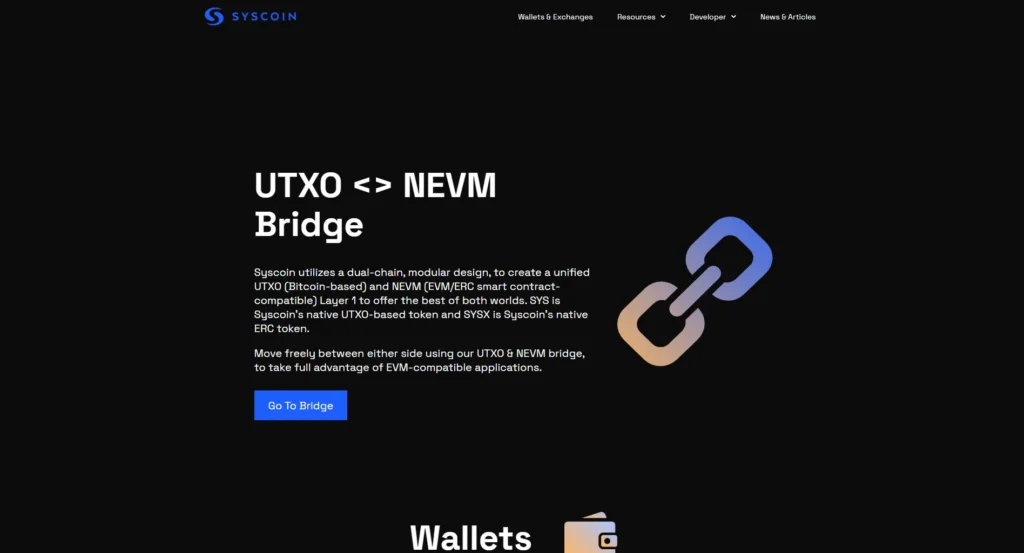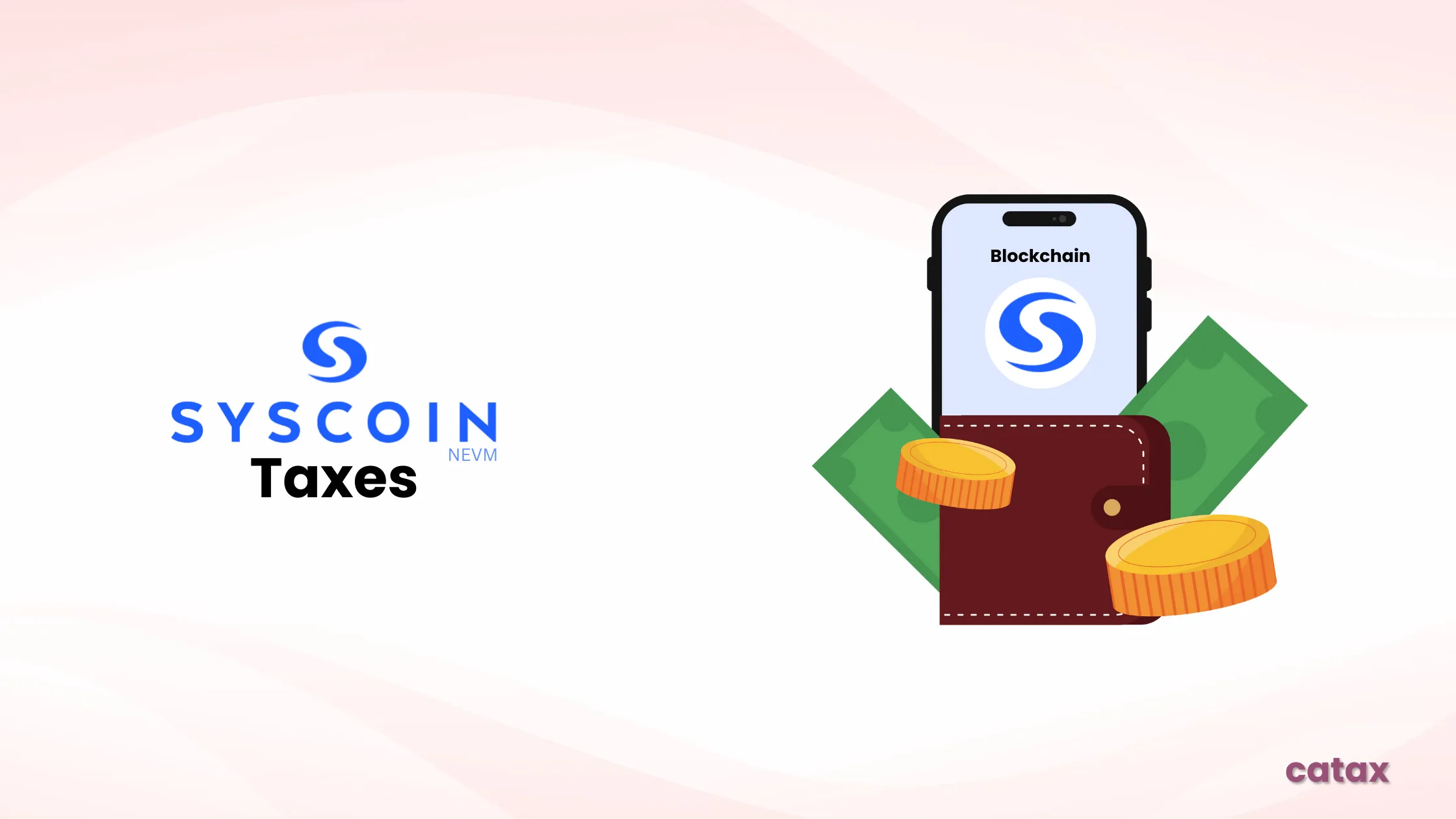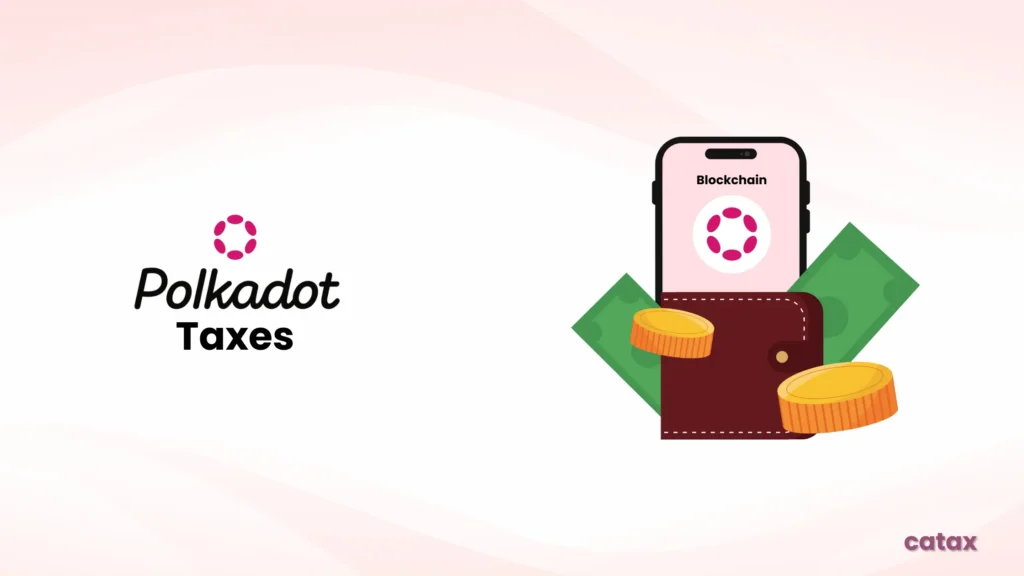Cryptocurrency tax rules vary by country, and Syscoin NEVM taxes transactions may be taxed differently depending on local regulations. Whether you buy, sell, trade, or stake SYS on the NEVM chain, understanding how tax authorities classify these activities helps you stay compliant and avoid penalties.
This guide simplifies Syscoin NEVM tax rules so you can manage your taxes confidently and stay on the right side of the law.

- How to Connect Your Syscoin NEVM Wallet to Catax?
- Are Syscoin NEVM (SYS) Transactions Taxable?
- Can You Deduct Trading Fees and Other Costs?
- How Is Syscoin NEVM (SYS) Taxed Based on Holding Period?
- How Is Staking Income Taxed?
- Can You Claim Syscoin Losses for Tax Benefits?
- How to Stay Compliant with Syscoin NEVM (SYS) Tax Rules
How to Connect Your Syscoin NEVM Wallet to Catax?
To easily track your Syscoin NEVM (SYS) transactions and calculate taxes, follow these steps to connect your wallet to Catax:
- Open your Syscoin NEVM-compatible wallet or a block explorer
(such as MetaMask, Trust Wallet, or any supported wallet connected to the NEVM network). - Copy your public wallet address from your Syscoin NEVM wallet.
On Catax:
- Log in to your Catax account and select your country.
- Choose Chain, then search for Syscoin NEVM.
- Paste your public wallet address and click Connect.
Once connected, Catax will automatically track your SYS transactions on NEVM and simplify your crypto tax reporting.
Calculate My Taxes ➤Are Syscoin NEVM (SYS) Transactions Taxable?
Yes, in most countries, Syscoin NEVM (SYS) transactions are taxable. Tax authorities may classify SYS as a capital asset, property, or income depending on how you use it.
When Do You Have to Pay Taxes on Syscoin NEVM (SYS)?
You may need to pay taxes in the following situations:
- Selling SYS for a profit – If you sell your SYS tokens for more than you originally paid, the gains are usually subject to capital gains tax.
- Trading SYS for another cryptocurrency – Exchanging SYS for Bitcoin, Ethereum, or any other token is typically considered a taxable event.
- Using SYS for purchases – Spending SYS to buy goods or services may result in a taxable gain if the token has increased in value since you acquired it.
- Earning SYS through staking or yield farming – SYS earned via staking or similar activities is generally treated as income and taxed when received.
- Receiving SYS as payment – If you’re paid in SYS for work, services, or products, the amount received is typically taxed as income based on its market value at the time of receipt.
Always review your local crypto tax laws, as treatment of digital assets varies by country.
Can You Deduct Trading Fees and Other Costs?
Syscoin NEVM users often ask if they can claim deductions on expenses related to trading or holding SYS. This depends on your jurisdiction’s tax laws.
Some countries allow deductions for:
- Trading fees when buying or selling SYS
- Network or gas fees used for moving SYS on the NEVM chain
Others only allow deduction of:
- The purchase cost (cost basis) of SYS, without allowing additional fee or storage deductions.
Review your local tax regulations to know which expenses are deductible.
How Is Syscoin NEVM (SYS) Taxed Based on Holding Period?
Tax rates on SYS gains may depend on how long you hold your tokens:
- Short-term holdings (less than 1 year) – Typically taxed at your standard income tax rate.
- Long-term holdings (more than 1 year) – Some jurisdictions offer reduced tax rates on long-term capital gains.
- Flat-tax countries – Some regions apply a single fixed tax rate on all crypto profits, regardless of holding duration.
Understanding how your country handles crypto taxation can help you optimize your tax strategy and potentially reduce your liability.
You can also check out our Country-Specific Guide for Crypto in Your country. This guide provides insights on regulations, tax implications, and compliance measures breifly explained for each country.
How Is Staking Income Taxed?
Staking Syscoin NEVM (SYS) can offer passive income, but how that income is taxed depends on your country. Some governments tax staking rewards as soon as you receive them, while others only apply taxes when you sell or exchange your SYS.
How Countries Tax Staking Rewards
- Taxed as income – In some jurisdictions, staking rewards are treated like salary or interest income and taxed when received, based on the fair market value of SYS.
- Taxed as capital gains – In other countries, staking rewards are only taxed when you sell or swap them, meaning only the profit from the sale is taxed.
Understanding when and how taxes apply helps you plan ahead and avoid unexpected liabilities. In some countries, staking rewards are taxable even if you don’t sell them.
Can You Claim Syscoin Losses for Tax Benefits?
Not every Syscoin trade ends in profit. If you sell SYS at a loss, you may be able to use that loss to reduce your overall tax burden. Here’s how different countries handle crypto losses:
- Loss offsets – Some countries allow you to offset Syscoin losses against gains, reducing your total taxable income.
- Loss carryforward – If you don’t have gains this year, some jurisdictions allow you to carry losses forward to offset future profits.
- Limited or no deductions – A few governments don’t permit crypto loss deductions, meaning you can’t reduce your tax liability using those losses.
Maintaining accurate records of your transactions is critical for correctly reporting losses and claiming any applicable benefits.
How to Stay Compliant with Syscoin NEVM (SYS) Tax Rules
As crypto tax regulations continue to evolve, staying compliant helps you avoid penalties and fines. Here’s what you should do:
- Understand how your country taxes SYS — Is it treated as income, capital gains, or business revenue?
- Check what costs you can deduct — Some countries allow deductions for trading fees, staking rewards, or wallet security expenses.
- Maintain detailed records of all SYS activity — Including buying, selling, trading, staking, or spending Syscoin.
- Use a crypto tax tool like Catax — Catax automates transaction tracking and tax calculations to simplify your reporting.
- Consult a tax expert — A qualified tax advisor can guide you based on your local regulations and crypto activity.
Staying informed and organized will help you manage your Syscoin NEVM taxes effectively and stay on the right side of the law.
Book a Free Consultation Now →

